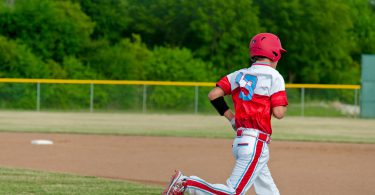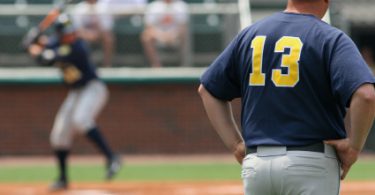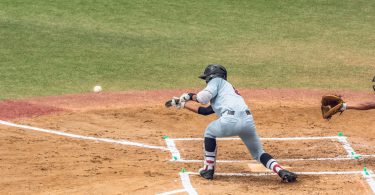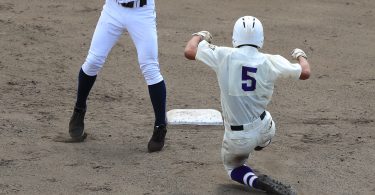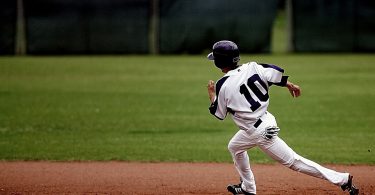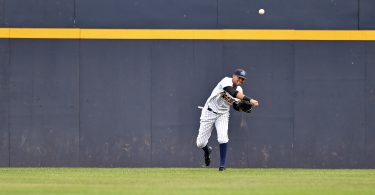The Situation:
Runners are on 2nd and 3rd with two outs in the top of the 9th of a 5-5 game. The hard throwing, right-handed closer is in the game facing the speedy lead-off man who hits from the left side. The count is 1-1 and because of the slap nature of the hitter and velocity of the pitcher, the infielders are shaded to the opposite field side. The shortstop has moved in the 5-6 hole, the 2nd baseman is shaded up the middle, and the corners are deep with the 3rd baseman on the line and the 1st baseman into the 4-hole, giving up the line.
The Play:
The pitcher comes set and delivers a blazing fastball on the outer 3rd of the plate. The hitter, who is expecting a fastball, sees the pitch well and puts a good swing on it. He drives a bounding ball the other way, destined for left field grass on any normal defensive alignment. Runners are moving at the crack of the bat. Even with the shift, the ball looks like it is going to sneak through the left side, destined for left field. But the shortstop has other ideas. To everyone’s surprise, he times his dive perfectly and snares the ball. He pops up quickly and opens up his front hip to throw to first. He gets the ball out of his glove and appears to throw to first, only it’s an arm fake! The third base coach tries to hold up the runner who by that time was rounding third base, but the runner can’t change direction at that speed and slips on the grass.
The Outcome:
The shortstop spins, under control and throws to third. The 3rd baseman, who retreated to the bag knowing after his first few steps he had no play on the batted ball, is there waiting. The throw is right on the money and the helpless runner is tagged out trying to crawl back to 3rd. The lead has been surrendered, but the threat is over.
What Went Wrong:
Defensively, nothing went wrong. This play was executed to perfection—the positioning of the players, the 3rd baseman getting back to the bag, the idea to arm fake, the execution of the arm fake, the quality throw—all outstanding. When an infielder has no chance to get the batter at 1st and there are other base runners, an arm fake is always a good idea to try to catch a lead runner being overly aggressive and steal an out. Arm fakes cost you nothing (no risk) but can pay off with big rewards.
When pump faking, you want to try to make the fake throw and movements look as realistic as possible. After the arm fake, you always want to make sure you have your feet under you and in position to make the throw. The last thing you want to do is arm fake, have the out for the taking, then rush it and throw the ball away because you fail to reset your feet. Plays like this one show advanced baseball thinking and a ‘how to win’ awareness that coaches love in both recruits and players. If the ball had taken longer to get to the shortstop and the 3rd base coach was already wheeling the runner home, the arm fake would be unnecessary and the shortstop would instead want to reset his feet to throw home.
Offensively, the runner and 3rd base coach are caught in a tricky spot on this play. As a runner, if you are blind to the fielder as you are in this play, it is your job to pick up the 3rd base coach for help. Some 3rd base coaches will roll the dice and send a runner before they see the infielder release the ball. Others will hold the runner on the bag. The game situation and offensive philosophy will help dictate these decisions, but as a runner you can’t go wrong-doing what the base coach says. If you are not being sent, stop on the base and find the ball. Stay alert and aware and you can’t go wrong.


